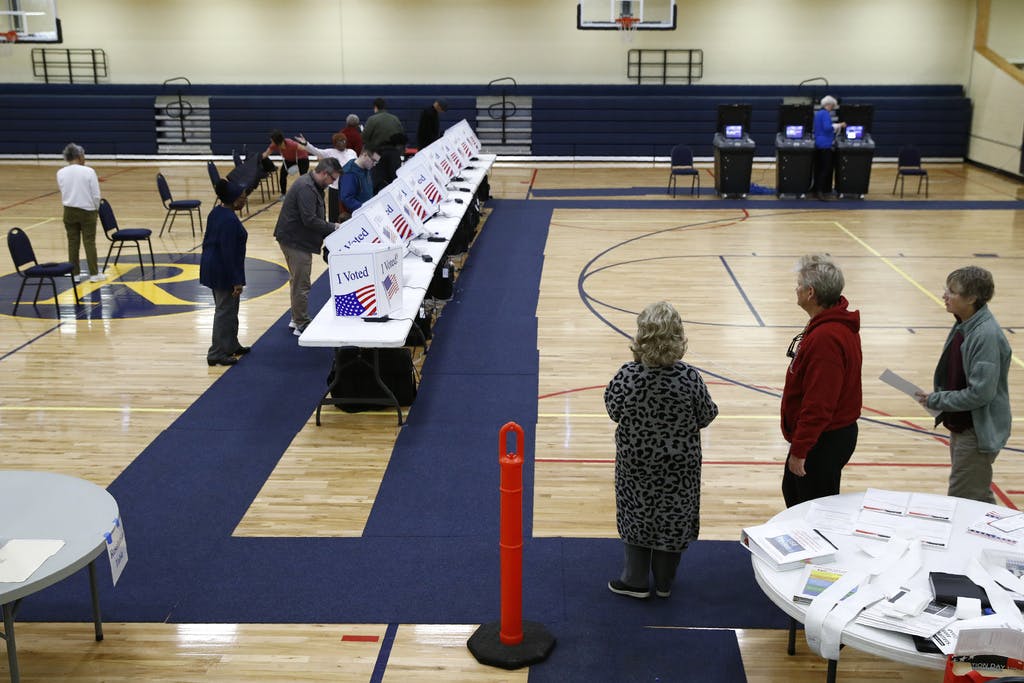Biden’s Message Falling Flat With Young Voters: Poll
One issue not present in the 2022 midterms that could pose a challenge for Democrats in 2024, however, is that key parts of the coalition that elected Mr. Biden are now expressing a willingness to consider candidates unaffiliated with either major party.

A new survey suggests that younger voters are dissatisfied with President Biden’s ability to deliver promised student loan forgiveness. Combined with the group’s disapproval of his handling of the conflict at Israel, the poll suggests that a year out, Mr. Biden’s support among young voters may be softening.
A new survey from Bloomberg and Morning Consult found that a plurality, or 41 percent, of swing-state voters born after 1997 said that Mr. Biden is doing “too little” to fulfill his promise of canceling student debt. Among all swing state voters, 27 percent said the same.
Respondents born after 1997 were also more likely to support the administration’s efforts to sidestep an unfavorable Supreme Court ruling and resistance from Congress and cancel around $127 billion in student debt, with 59 percent of swing state respondents born after 1997 supporting those efforts compared to 46 percent of all swing state voters.
The results from the new Morning Consult survey are another sign that Mr. Biden may be seeing softening support among younger voters.
Younger Americans are also less likely to approve of Mr. Biden’s handling of the situation at Israel and Gaza, with just 30 percent of respondents aged 18 to 34 approving of Mr. Biden on this issue, compared to 67 percent who disapprove, according to a recent Gallup poll.
Among respondents aged 35 to 54, approval is about evenly split, with 50 percent approving of Mr. Biden’s handling of the situation and 44 percent disapproving.
Among respondents aged 55 and older, 63 percent approve of Mr. Biden’s handling of the situation compared to 34 percent who disapprove.
An NBC News survey from late November found that Mr. Biden is now trailing President Trump among voters aged 18 to 34, 42 percent to 46 percent. Though the result was within the margin of error, it appears to signal support for Mr. Biden has slipped since 2020.
The Morning Consult survey found that, among swing state respondents, 23 percent of those who supported Mr. Biden in 2020 now have an unfavorable view of him today. For supporters of Mr. Trump, 17 percent of 2020 supporters of Mr. Trump now have an unfavorable view of him today.
Year-out polling like the Morning Consult/Bloomberg Poll and the NBC News poll is best taken as a snapshot of the current situation rather than a prediction of what will happen this coming November.
In the spring of 2022, similar headlines on how younger voters were turning on Mr. Biden made a splash as a warning to Democrats that younger voters might not support their candidates. In the 2022 elections, however, younger Americans broke overwhelmingly in favor of Democrats in almost every state, according to a Tufts CIRCLE analysis.
The bigger danger for Democrats is that younger voters and other key demographics simply might choose not to vote, and though voter turnout for voters aged 18 to 29 ticked down to 27 percent in 2022 from 31 percent in 2018 in competitive states, according to a Tufts CIRCLE survey, 2024 is widely expected to be a high-turnout election.
One issue not present in the 2022 midterms that could pose another challenge for Democrats in 2024, however, is that key parts of the coalition that elected Mr. Biden are now expressing a willingness to consider candidates unaffiliated with either major party.
“There is a good chunk of the electorate right now who is eyeing some of these alternative candidates and that is due to the fact that there are two very unpopular people facing off for the White House next year,” a Morning Consult polling analyst, Eli Yokley, told Bloomberg. “At this point, those dynamics are working in Donald Trump’s favor.”
Among Black voters, 42 percent said that they were either very likely or somewhat likely to consider candidates that were neither Republicans nor Democrats. Among Hispanic voters, 32 percent of respondents said the same.
Younger voters are also more willing to consider alternatives to major party candidates than older voters, with 51 percent of voters aged 18 to 34 saying they are willing to consider alternatives to Democrats and Republicans. Among voters aged 35 to 44, this number was 47 percent.
Among voters between 45 and 64 years old, 36 percent said they were willing to consider non-major party candidates. Among voters 65 and older, just 24 percent said they would.
In terms of how closely Americans are following Mr. Biden and Mr. Trump, 29 percent of registered voters said they had heard something about Mr. Biden in the past week and it was positive, 51 percent said they had heard something and it was negative, and 20 percent said they hadn’t heard anything at all.
For Mr. Trump, 22 percent of registered voters said they had heard something about Mr. Trump in the past week and it was positive, 60 percent said they had heard something and it was negative, and 18 percent said they hadn’t heard anything at all.
The survey of 4,935 registered voters across seven swing states, Arizona, Georgia, Michigan, Nevada, North Carolina, Pennsylvania, and Wisconsin, was conducted between November 27 and December 6 and had a margin of error for the whole sample of plus or minus one point.

